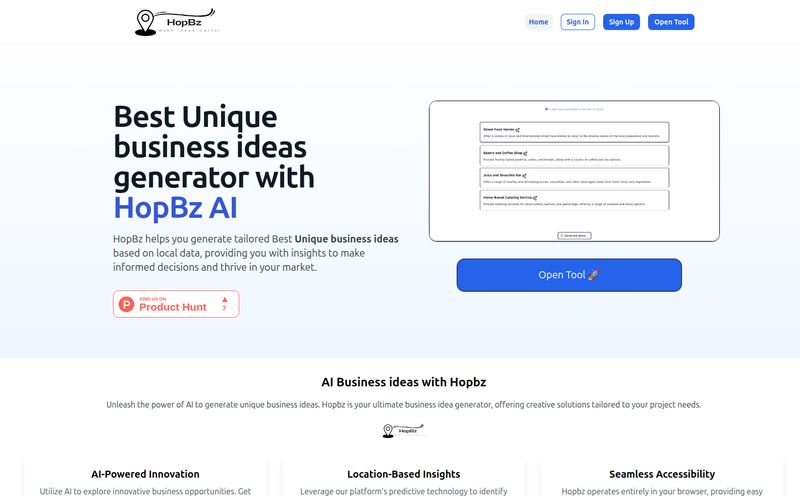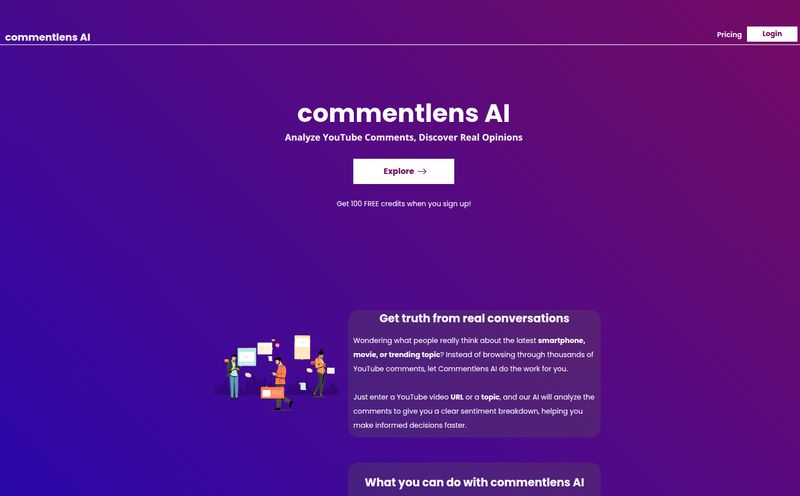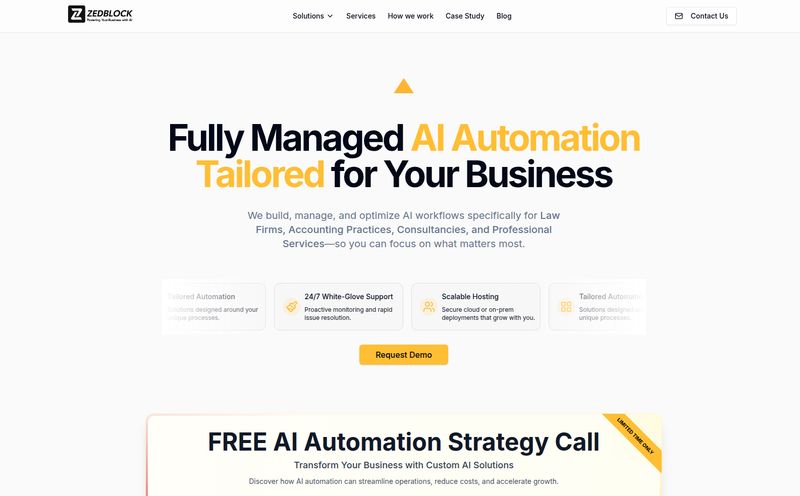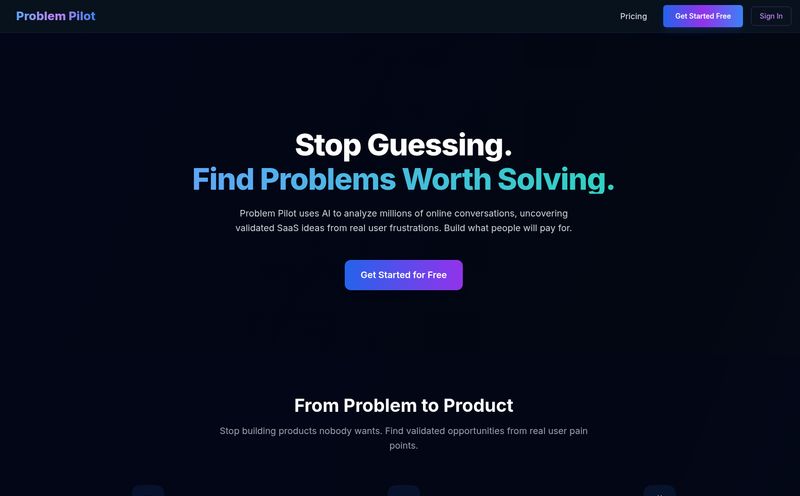If I see one more blog post titled “50 SaaS Ideas You Can Start Today,” I might just lose it. You know the ones. They’re always filled with the same tired suggestions: “a project management tool for cats,” “a social media scheduler for pigeons,” or my personal favorite, “a better CRM.” It’s not that the ideas are bad, per se, it’s that they exist in a vacuum. They’re solutions desperately searching for a problem.
For years, the startup gospel, preached by everyone from Paul Graham to your favorite tech influencer, has been simple: solve a real problem. Find a pain point so nagging, so persistent, that people are practically begging to throw money at you for a solution. But where do you find these problems? You could conduct interviews, run surveys, or… you could go to the place where millions of people complain about their problems every single day: Reddit.
The problem is, Reddit is a chaotic, beautiful mess. It’s like trying to find a needle in a continent-sized haystack. That’s where a tool I’ve been playing with, called Moonidea, caught my eye. It claims to use AI to do the dirty work, sifting through the digital noise to hand-deliver validated SaaS ideas. But does it actually work? Or is it just another shiny object for aspiring entrepreneurs? I had to find out.
What Exactly is Moonidea?
Think of Moonidea as a professional gold prospector for the digital age. But instead of panning for shiny rocks, it's digging through the vast mines of Reddit for nuggets of pure, unadulterated user frustration. It's built on a simple, yet brilliant, premise: the best business ideas come directly from the mouths (or keyboards) of people with a problem to solve.
The platform uses AI to automatically scan over a thousand different subreddits—from r/smallbusiness to r/ADHD to niche gaming communities—and analyzes conversations. It's looking for posts and comments where people are describing a challenge, wishing for a tool, or hacking together a clunky solution with spreadsheets and duct tape. You know, the classic signs of an untapped market.
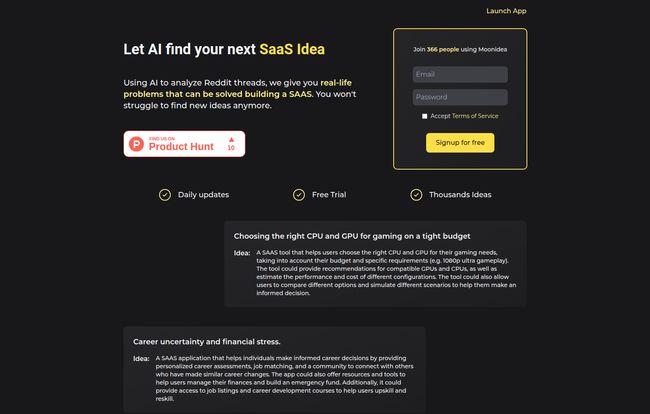
Visit Moonidea
How It Works: From Reddit Rants to SaaS Roadmaps
The process, as laid out on their site, seems pretty straightforward. It’s not just scraping keywords; there’s a level of curation and analysis that I found genuinely interesting. This isn’t just about quantity; it’s about trying to find quality signals.
The AI Reddit Crawler
First, the AI dives into the rabbit hole. We’re talking over 1000 subreddits and, according to their stats, hundreds of thousands of threads analyzed. This scale is something you or I just couldn't replicate manually. I mean, you could try, but you’d probably emerge three years later with a caffeine addiction and a deep-seated fear of cat memes. The AI does teh heavy lifting, identifying conversations that smell like opportunity.
Filtering for 'SaaS-ability'
This is the part that got my attention. Not every problem is a business. My Wi-Fi dropping during a critical meeting is a problem, but I’m probably not paying a monthly fee for a SaaS to fix it. Moonidea claims it filters these issues, looking specifically for problems that can be solved by building a Software-as-a-Service product. This is a crucial step that separates it from a simple Reddit search. It's looking for recurring, complex problems that a dedicated piece of software could genuinely simplify.
Grouping and Curation for Clarity
Finally, it takes all these similar pain points and groups them together. So instead of seeing 50 separate posts about the difficulty of tracking freelance invoices, you get one validated idea: “A streamlined invoicing and payment tracking tool for solo freelancers.” This grouping is smart; it acts as a form of validation. One person complaining is an anecdote. A hundred people complaining is a market.
My First Impressions and a Little Walkthrough
Signing up for the free trial is painless. The interface is clean, dark, and gets straight to the point—no fluff. You're immediately presented with a stream of ideas. Each one is presented as a card with a clear title and a description of the problem and the proposed SaaS solution.
For instance, one of the examples on their homepage is an “Adult ADHD diagnosis process” platform. The problem? People struggle to understand the diagnosis process and manage their condition. The solution? A SaaS that educates users, helps them track symptoms and provides a communication portal with healthcare providers. This is... actually a really solid idea. It’s specific, it addresses a real and often emotional pain point, and it has clear potential for monetization. It's a far cry from “a better to-do list.”
I’ve always felt the best ideas are born from empathy, and this method bakes empathy right into the process.
Let's Talk Money: The Moonidea Pricing Model
Alright, let’s get to the brass tacks. How much does this cost? Moonidea uses a credit-based system, which I have mixed feelings about, but in this case, I think it makes sense. You don't pay a monthly subscription. Instead, you buy credits, and you use one credit to unlock the full details of an idea.
Searching and browsing the high-level ideas is free. You only pay when you find something that piques your interest and you want to see the deeper analysis. Here’s how it breaks down:
| Credits | Price |
|---|---|
| 150 Credits | $10 |
| 300 Credits | $25 |
| 750 Credits | $49 |
| Enterprise | Contact Them |
Personally, I appreciate a pay-as-you-go model for a tool like this. As an indie hacker or a bootstrapper, the last thing you want is another recurring $29/month charge for a tool you might only use intensely for a week or two while you're in the ideation phase. This model lets you control your spend. Find a few gems for ten bucks? Great. Job done.
The Good, The Bad, and The AI
No tool is perfect, right? After poking around, here’s my honest take on what works and what you should be aware of.
What I Really Like
The biggest advantage is starting with a validated problem. You’re not guessing what people want; you’re starting with direct evidence from real communities. It completely flips the script from “I have a cool idea, who can I sell it to?” to “Here’s a group of people with a problem, how can I best solve it for them?” That’s a much stronger foundation for a business. The fact it got #1 on Product Hunt also tells me that other people in the tech space see the value here—it's solid social proof.
A Few Things to Keep in Mind
Of course, there are caveats. The quality of the ideas is entirely dependent on the AI's interpretation. While the examples look good, an AI can still miss nuance or context. You can’t just take an idea and run with it blindly. You still need to do your own research, understand the target audience, and bring your own expertise to the table. This tool isn't a replacement for founder intuition, it's a supplement to it. Also, the credit system, while fair, means you're paying per-idea. If you're the type who wants to unlock dozens of ideas to compare, it could add up.
Who is Moonidea Really For?
So, who should pony up the $10 for some credits? In my opinion, Moonidea is perfect for a few specific types of people:
- Indie Hackers & Bootstrappers: People who want to build a profitable micro-SaaS but are stuck in the idea phase.
- Product Managers: Looking for new feature ideas or even whole new product lines based on real user feedback.
- Entrepreneurs with 'Builder's Itch': You know you want to build something, but you're waiting for the right problem to fall in love with.
It's probably not for someone looking for a get-rich-quick scheme or a business-in-a-box. It’s a starting point, a compass pointing you toward a promising patch of land. You still have to do the hard work of digging for the gold yourself.
Final Thoughts: A Better Way to Brainstorm?
I came into this review a bit skeptical, as I always am with AI-powered 'solution' tools. But I'm walking away pleasantly surprised. Moonidea isn't trying to be a magic bullet. It's a pragmatic, focused tool that automates a process many successful founders have done manually for years: listening to customer pain.
Will it find you the next billion-dollar unicorn? Maybe, maybe not. But it will almost certainly save you from building something nobody wants. And in the world of startups, that's priceless. It provides a data-driven starting point, shifting your energy from brainstorming in a void to solving problems that people are already talking about. For the price of a few cups of coffee, that’s a pretty powerful advantage.
Frequently Asked Questions
How is Moonidea different from just browsing Reddit myself?
It’s about scale and efficiency. Moonidea analyzes thousands of threads across 1000+ subreddits automatically, a task that would take a human hundreds of hours. It also filters and groups the findings specifically to identify problems that could be solved with a SaaS model, saving you from reading irrelevant content.
Is Moonidea free to use?
Yes and no. There is a free trial. You can browse the high-level ideas for free. To see the full details, analysis, and source threads for a specific idea, you need to spend one credit. You purchase credits in packs, starting at $10 for 150 credits.
What kind of ideas can I find on Moonidea?
The ideas are incredibly diverse because they're sourced from all corners of Reddit. You'll find B2B ideas from business subreddits, consumer app ideas from hobbyist communities, health-tech ideas, dev tools, and more. The examples range from gaming budget tools to financial planning apps and ADHD management platforms.
Do I need to be a programmer to use Moonidea?
Not at all. The tool is for idea generation. It's valuable for anyone in the startup ecosystem—non-technical founders, marketers, product managers, and investors—who wants to understand market needs. You'll need development skills (or a technical partner) to build the idea, but not to find it.
Is the credit system worth it?
In my opinion, yes, for its target audience. It avoids a recurring subscription, making it a low-risk investment for indie developers or anyone in the early, uncertain stages of a project. You only pay for the specific ideas that you believe have potential.
Can I trust the AI's analysis completely?
You should treat it as a highly-qualified starting point. The AI is a powerful tool for identifying patterns and potential, but it can miss human nuance. Always use the information from Moonidea as the beginning of your own, deeper customer research, not the end of it.
